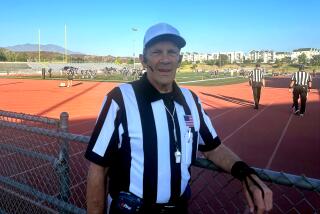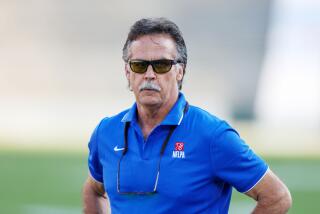When it comes to commissioners, David Stern is top pick — for now
- Share via
Roger Goodell led the NFL through a lockout without losing regular-season games and with a minimum of acrimony, ensuring labor peace for a decade.
David Stern saved the NBA after it had lost its appeal and financial footing.
Bud Selig, awkward on camera, is savvy enough behind the scenes to have helped Major League Baseball enjoy a long period of labor harmony.
Everyone’s kid has played soccer, but MLS Commissioner Don Garber is still trying to turn participants into paying customers.
Gary Bettman’s name is a curse among Canadians, who believe the NHL disrespects its northern roots.
A few years ago, few people could have picked Larry Scott or Mike Slive out of a lineup. Now, they’re changing the landscape of college football as commissioners of the Pacific 12 and Southeastern conferences.
The assignment: rank the best current commissioners in sports, factoring in various economic, labor and field-of-play issues. The consensus of several sports business experts was that Stern is No. 1, though with an asterisk because of the labor dispute that led him to lock players out on July 1.
“At the collegiate level right now, no one’s killing it like Larry Scott is. To do what he has done with the Pac-12 is astounding,” said Scott Rosner, associate director of Wharton Sports Business initiative at the University of Pennsylvania. “Track record, though, I think you have to give it to David.
“To think about where this sport was when he took over in the early ‘80s, so many teams losing money — the majority of the teams losing money — the Finals were on tape delay in many markets across the country, and David has brought that league to where it is.
“That said, if you’re grading on the latest semester his grade wouldn’t be as strong, obviously, with the lockout. And this is in many respects important to his legacy, but my sense is when all is said and done that the owners will score a pretty major victory.”
A fan’s criteria for judging a commissioner might differ from standards applied by owner or economist. Many fans see Bettman as a heartless robot who snuffed out the game’s soul. But he’s also a smart executive who built revenue from $400 million in 1993 to nearly $3 billion in 2010-11 and greatly expanded the NHL’s reach — if sometimes for worse, not better.
And since the fortunes of the Professional Golfers Assn. Tour parallel those of Tiger Woods, whose fortunes have dimmed, it’s tough to analyze the performance of its commissioner, Tim Finchem.
The notion that a commissioner’s chief job is to safeguard the integrity of the game doesn’t hold true anymore, if it ever did.
“The bottom line when judging the success of a commissioner is the extent to which he relentlessly helps the owners increase their franchise values,” said David Carter, professor of sports business at USC’s Marshall School of Business.
“Building consensus among ownership on issues ranging from labor relations and business development, to navigating the rapidly evolving media landscape, is critical, but only if they lead to generating substantial revenue over time.”
Robert Boland, professor of sports business at New York University’s Tisch Center, agreed that the notion of the commissioner as moral compass is outdated.
“The commissioner’s job has transformed almost to being the chief operating officer,” Boland said. “With the growth of concerted activity in the league model, in the last 50 years, since the NFL signed their television agreement to put all their games on television and share that revenue, the power and stature of the league in business affairs has grown in almost every case.”
A commissioner must also be a politician.
“Getting three-quarters of the owners to agree to anything is remarkable,” Rosner said. “It’s like herding cats.”
More to Read
Go beyond the scoreboard
Get the latest on L.A.'s teams in the daily Sports Report newsletter.
You may occasionally receive promotional content from the Los Angeles Times.











